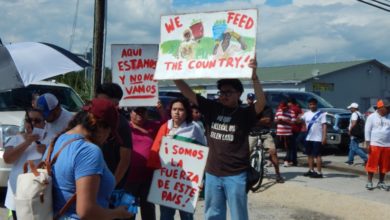In response to proposed racist,
anti-immigrant state legislation, a rally coinciding with the first
day of Utah’s legislative session was held at the Utah State Capitol
in Salt Lake City raising the demands “Don’t let Utah become Arizona!” and “Now is the time to stand up and fight
back for immigrant rights!”
About 300 people gathered for the Jan.
24 rally organized by United for Social Justice, which focused on defending constitutional
and workers’ rights. USJ demanded an end to the ICE raids and to
the overall persecution of immigrant communities. The rally also promoted
full equality in wages, jobs, voting, union rights, benefits, housing, health
care, and education for everyone regardless of their immigration status.
Speakers advocated for full
legalization for the undocumented and their right to liberty. Immigration
attorney Mark Alvarez spoke on the effects that proposed legislation would have
on the immigrant communities of Utah. Other
speakers included William Van Wagenen, founder of The Mormon Worker magazine,
and community activists Archie Archuleta, Nadia Espejel and Samuel Rangel. Dr.
Michael Minch of the Utah Valley University Peace Studies department addressed
the rally as well, and Rev. France Davis led a closing prayer.
Melodía Gutiérrez and Gregory Lucero
of the USJ served as MCs. They led the crowd with chants of “What do we
want? Amnesty. When do we want it? Now!” and “They say ICE attack, we say fight
back!”
Currently in Utah, there are two
proposals for a “state solution” to immigration: one from Rep. Stephen
Sandstrom (R) and the more recent offering by State Sen. Luz Robles (D). The Sandstrom proposal is basically a
copycat of Arizona’s SB 1070, and the Robles option is barely distinguishable
from that of her Republican counterpart. In fact, Robles has teamed up with and
crafted her proposal with the help and guidance of Paul T. Mero, the head of
the Sutherland Institute (a right-wing think tank).
Robles is calling her proposal the
Utah Pilot Accountability Permit Program. Two key features are: 1) work-permits
that would qualify undocumented residents to work in the state, and 2) the
heavy enforcement by Utah state police of these undocumented residents. Under
provisions in the Robles bill, undocumented immigrants would need to pass a
background check before qualifying for a permit to live and work in Utah.
The background checks would be managed
by the Utah Department of Public Safety and the national Secure Communities
system, and would require that undocumented people in the state prove
proficiency in the English language as a part of getting and maintaining a work
permit. Robles and Mero have repeatedly emphasized the severity of their
enforcement mechanisms, saying that they are “stronger than an Arizona-style
program.”
These guest-worker programs would
create an underclass of cheap, super-exploited labor. The programs are designed
to meet the needs of the capitalist class, not the needs of those struggling to
work and survive in the state of Utah.
State resources in Utah are already
stretched, and both the Sandstrom and Robles bill, with a heavy emphasis on
state enforcement of immigration laws, would likely overburden the state budget
and take money away from funding for education and other human needs.
More than a dozen states in the U.S.
are considering following in the footsteps of Arizona’s’ SB 1070, which
requires local police officers to check the immigration
status of people they “suspect”
may be in the country without domcuments, resulting in de facto racial profiling.
Immigrants in the U.S. have a long
history of being scapegoated because the ruling class has tried to pit worker
against worker, displacing and manipulating class conflict into anti-immigrant
reaction. Immigrants in Utah now, like those who came before them, suffer all
sorts of discrimination. The Jan. 24 rally at the state capitol exposed these
anti-immigrant proposals for what they are and helped to unite people in Utah in
the fight to stop these discriminatory policies.





